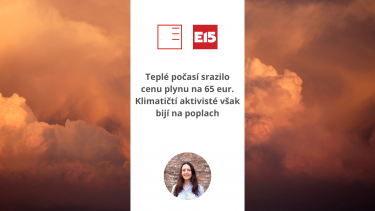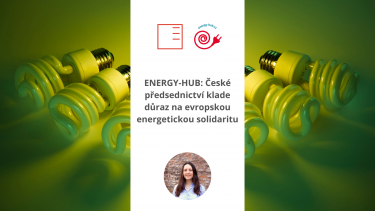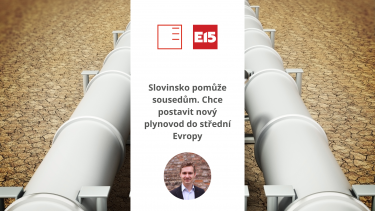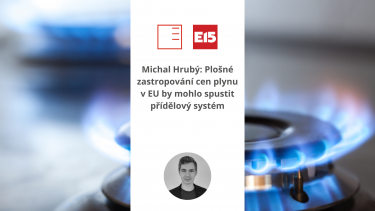iRozhlas.cz | Fossil fuel boilers are not banned by the European Union
The information about an EU-wide ban on gas and coal boilers, that has been recently circulating on social media, is not true. The aim of the new European directive is not to ban them, but to promote the phasing out of these boilers in line with the 2050 carbon neutrality targets. Viktor Daněk, deputy director of the EUROPEUM Institute, described the nature of the directive to the iROZHLAS.cz project Ověřovna.
Show moreTN.cz | EUCO summit: European Union agrees to help Ukraine
Another summit of the EU leaders' in Brussels has ended. What topics were discussed? Deputy director and head of the Brussels office of the EUROPEUM Institute Žiga Faktor described the conclusions for TN Live.
Show more
Hospodářské noviny | We are threatened by the influx of refugees and the loss of oil and gas. It is not in our interest to support everything Israel does
"Europe must stand behind Israel and support its right to exist. But that does not mean that it should take a completely unilateral position on the Gaza conflict. It would pay the price for that", says Luuk van Middelaar, a professor and one of the most respected commentators on events in the European Union, in an interview with Hospodářské noviny. Midelaar participated in the Prague European Summit organised, among others, by the EUROPEUM Institute.
Show moreE15: Warm weather pushes gas price down to 65 euros. But climate activists are sounding the alarm
Our senior researcher Kateřina Davidová was mentioned by the news portal E15 in their article about the mild winter weather contributing to cheaper gas. The article also highlights the possible consequences of the current "warm winter".
Show more
ENERGY-HUB: Czech Presidency emphasises European energy solidarity
Our senior researcher Kateřina Davidová participated in the conference "How did the Czech Republic turn green during the European Presidency?". She commented on what she believes is the success of the Czech Presidency.
Show more
Aktuálně.cz: It will be essential that at least part of the electric vehicle supply chain is in the Czech Republic
On the occasion of the conference on the topic "How did the Czech Republic turn green during the European Presidency?" spoke our senior researcher Kateřina Davidová. She mentioned that the Czech Republic has promoted a unified approach of the EU countries in the energy sector during the Presidency, for example by having a higher than the standard number of ministerial councils for this issue. She also commented on the ban on selling cars with internal combustion engines after 2035. She says that it will be essential that at least part of the supply chain for electric cars is in the Czech Republic.
Show more
E15: Slovenia will help its neighbours. E Slovenia wants to build a new gas pipeline to Central Europe
Slovenia plans to build a gas pipeline to Central Europe to help Central European countries get rid of their dependence on Russian gas. Our researcher Michal Hrubý also commented on the topic for E15.
Show moreEnergie bez emisí: The decline of fossil fuels is clear, the biggest challenge is to solve raw material dependence
Our researcher Michal Hrubý was a guest on the Energy Without Emissions podcast. He answers questions on issues such as current energy prices and their possible future development, what impact climate change will have on industry, what is the state's strategy or how the state is approaching the situation.
Show moreiDNES.cz: Will the EU find a common solution to the energy crisis?
The current price stability of the gas market does not mean the end of problems with possible shortages. The European Commission has therefore prepared a series of measures to stabilise the market and ensure that there will be plenty of gas next year. Our senior research fellow Kateřina Davidová commented on what measures are on the table and how individual countries will respond to the crisis.
Show more
E15: Michal Hrubý: Capping of gas prices in the EU could trigger a rationing system
The European Political Community Summit brought together statesmen from all over Europe. One of the key issues discussed is energy and the search for a common solution to the energy crisis. The proposals presented are aimed at influencing gas and electricity prices, but the scope and method of intervention vary from plan to plan, as our researcher Michal Hrubý points out in an article for E15. He also discusses the implications of the solutions, such as the possibility of an energy rationing system.
Show moreStaroměstské náměstí 4/1
Prague 1 - Staré Město
110 00
tel.: +420 212 246 552
email: europeum@europeum.org
https://www.europeum.org









